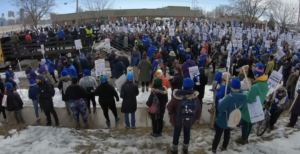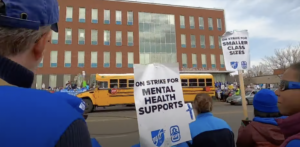What’s inside the $175 million agreement between Portland schools, teachers?
(The Center Square) – Students have returned to school in Portland as the teachers’ union and district have yet to vote on an agreement to end the weekslong strike, which kept students out of…

(The Center Square) – Students have returned to school in Portland as the teachers’ union and district have yet to vote on an agreement to end the weekslong strike, which kept students out of class for most of November.
The Portland Association of Teachers and Portland Public Schools announced a tentative agreement Sunday, ending a strike that began on Nov. 1. The union called the strike a win in an update to members. The district said in an update that the contract will cost taxpayers an additional $175 million over the next three years.
To make up 11 days of lost instructional time, students will attend school on Dec. 18-22, Jan. 26, Feb. 19, April 8 and June 12-14, according to the district.
The tentative agreement requires ratification by the union and school board Tuesday evening. As it stands, the contract increases teacher pay through cost-of-living adjustments. Teachers will receive 6.25% higher pay in the 2023-24 school year, 4.5% in 2024-25 and 3% in the 2025-26 school year.
The national average starting teacher salary is $42,844, the National Education Association estimates. The starting salary for professional educators associated with the Portland Association of Teachers is $50,020, according to district documents.
PPS said that about half of the teachers in the district would earn an extra 10.6% through yearly step increases. The agreement also creates committees comprised of school officials and union-picked teachers and representatives to manage class sizes.
Parents will be allowed to join, and teachers can attend meetings. Teachers will also receive a stipend per student for class sizes that exceed the contract’s established limits. Class size and workload were among the major concerns cited by the union for striking, along with student discipline and compensation concerns.
The contract also replaces previously required minimum student suspensions with restorative justice. A researcher told Chalkboard this summer that restorative justice practices may not be as effective for middle school students and can be costly to implement.
“The District and Association are committed to an approach for student conduct and discipline that aligns with the PPS Vision and utilizes research based in Racial Equity and Social Justice, Restorative Justice, and Trauma Informed to minimize the use of exclusionary discipline and to maximize instructional time while repairing harm done within the school community,” the tentative agreement reads.
The new policy requires that if a student is continuously disruptive, educators and administrators, along with the student and parent, will create a support plan that “must take into consideration the impact of issues related to the student’s trauma, race, gender identity/presentation, sexual orientation, disability, social-emotional learning and restorative justice as appropriate for the student.”
The district said the tentative agreement “triples the district’s Rapid Response Team to support mental and behavioral health needs in school communities.” According to Sunday’s agreement, the team “will be deployed to schools when a student’s behavior is unsafe or disruptive and when the school’s climate team has determined building-level support is insufficient.”
The tentative agreement also created a new article dedicated to special education caseloads for special education teachers and psychologists and to continue negotiations over a new article for early childhood educators within two months of ratification.
Portland Public School superintendent said it was hard to be out of school, but thanked teachers, students and their families for their patience.
“We are relieved to have our students returning to school and know that being out of school for the last three weeks — missing classmates, teachers, and learning — has been hard for everyone,” Superintendent Guadalupe Guerrero said in a newsletter on Sunday. “We thank our students, families, and community for your patience and perseverance through these protracted negotiations.”
“We also want to express our deep appreciation for our educators, who are the backbone of our district and who enrich the lives of our students,” Guerrero wrote.
The superintendent said the tentative contract would require the district to make “significant” cuts come spring.
“This contract will cost roughly $175 million over the next three years, and this process has brought sharp attention to the state’s underfunding of quality education,” Guerrero said. “As we have said before, it will involve making significant cuts during our spring budget process for the upcoming school year, and we will handle those as with all budgeting — with input from our community.”
In a bargaining update, the Portland Association of Teachers hailed the signing of the tentative agreement as a win.
“This contract is a watershed moment for Portland students, families, and educators. Educators have secured improvements on all our key issues,” the bargaining team said. “These changes will make a huge difference on priorities like mental health supports for students, educator workload relief, and safe and welcoming school environments.”
According to that bargaining update, Becky Pringle, president of the National Education Association, said, “The steadfast dedication and unity shown have not only strengthened Portland Public Schools but have set a powerful example to districts across the nation. When we organize and work together, we can create positive change and foster an environment where teachers and students alike can thrive.”
The tentative agreement also replaces gendered pronouns like “he” and “she” with “they” throughout the document.



